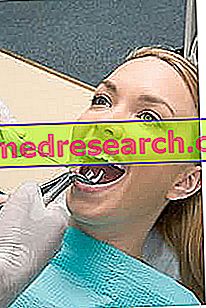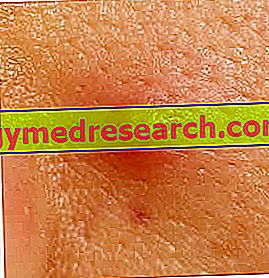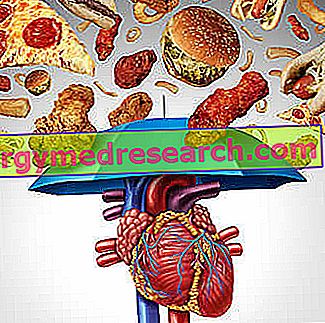Watch the video
X Watch the video on youtubeBecause the dentist is needed
Toothache is an alarm bell, a clear warning signal that should prompt you to ask the dentist for help.

What to do, therefore, in the presence of toothache? What are the most appropriate dental procedures? How can you stop the pain at home?
Meanwhile...
Before the dental visit (which must be requested as soon as possible) the victim can stem the toothache by putting into practice some simple tips:
- Take, as needed, a pain medication (ibuprofen is the most indicated active ingredient for controlling toothache). Let us briefly recall that the effect of NSAIDs is purely symptomatic: these analgesics act exclusively on painful symptoms, but do nothing to resolve the triggering cause. In any case, before taking the drug, it is advisable to consult a doctor
- Wash your teeth with warm water, never too hot or too cold. Thermal stimuli can indeed aggravate toothache
- A toothache that persists for a few days can be appeased by the external application (on the cheek) of an ice bag, possibly wrapped on a soft cloth
- Use dental floss or brush carefully: incorrect use can irritate the gums and accentuate pre-existing toothache
- Brush your teeth with good quality toothpastes. In case of toothache associated with dental hypersensitivity it is advisable to avoid abrasive / whitening toothpastes, which could make the teeth even more sensitive, accentuating the pain. Fluoride toothpastes are recommended.
- Avoid taking too hot or iced food: extreme temperatures could aggravate toothache
- Avoid chewing gum or nibbling on pens and pencils
- After medical consultation, it is possible to control the pain by applying a lidocaine-based gel (local anesthetic) to the sore tooth gum
- Use a soft bristle toothbrush. Avoid the electric toothbrush and those with too hard bristles
- Perform proper oral hygiene, always brushing your teeth after meals
What to do?
In the presence of a persistent toothache, treatment should begin as soon as possible for at least two reasons:
- Remove the pain in a short time
- Prevent complications such as deep dental infections (pulpits, granulomas, cysts, dental abscesses, etc.)
Although today it is quite rare to have to resort to extracting teeth affected by mild to moderate infections, it is recommended not to delay. Turning to the dental practice as soon as possible, you can prevent the toothache from turning into an unbearable torment. We remember, in fact, that the bacteria begin their destructive path starting from the tooth enamel, and then go deeper and deeper: even a small cavity can, in the long term, create a disproportionate damage (serious infections, tooth drop, etc.). ), also flowing into the surrounding tissues.
Type of intervention
Recall that toothache presents a multifactorial origin; therefore, before proceeding with any intervention, the dentist will have to trace a diagnosis carefully evaluating the lesion and analyzing the symptoms reported by the patient. Toothache can in fact depend on dental infections (caries, pulpits, abscesses, granulomas, cysts, etc.), traumas (falls or burns of the dental pulp following professional tooth whitening treatments), inadequate dental cleaning, stress, bruxism, cardiac disorders and sinusitis.
To simplify understanding, the following diagram shows the types of intervention indicated for the most common causes of toothache.
Toothache addicted to ... | Possible solution / dental intervention |
Slightly-moderate tooth decay | filling |
Complicated caries / pulpitis | devitalization |
| Complicated non-repairable pulpitis with devitalization | Tooth extraction |
Tooth abscess | Antibiotic treatment Drainage of pus |
Dental cyst | Surgical removal of the infection apicectomy Tooth extraction (complicated case) |
Dental granuloma | devitalization apicectomy |
alveolitis | There is no treatment: toothache tends to gradually fade |
Gingivitis | Treatment depends on the cause responsible for gingival inflammation |
| Chipped teeth (toothache depends, in this case, on exposure of the dental pulp) | Tooth reconstruction |
Growth of milk teeth | There is no specific treatment to reduce toothache and gum disease induced by the rash of a milk tooth |
| Professional tooth whitening | Toothache is resolved in a couple of days, without necessarily intervening with a dental operation. In these cases it is recommended to avoid the use of brushes with hard bristles and aggressive / whitening toothpastes as long as the toothache has passed. |
Bruxism and stress | Trying to relax is the most effective remedy to combat stress-dependent toothache. Bites can also help to treat bruxism with all its symptoms |
Dental hypersensitivity | Avoid taking too hot or iced food Prefer delicate, fluoridated toothpastes and avoid bleaching or too aggressive ones |
Cardiac disorders | In this case, toothache is a reflection of a very important pathology (eg angina, myocardial infarction); it is recommended to implement all the recommendations suggested by the doctor to prevent any cardiac complications and to treat the problem that arises at the origins. In these circumstances, toothache is a secondary symptom; the priority clearly rests with the cardiac disorder. |



